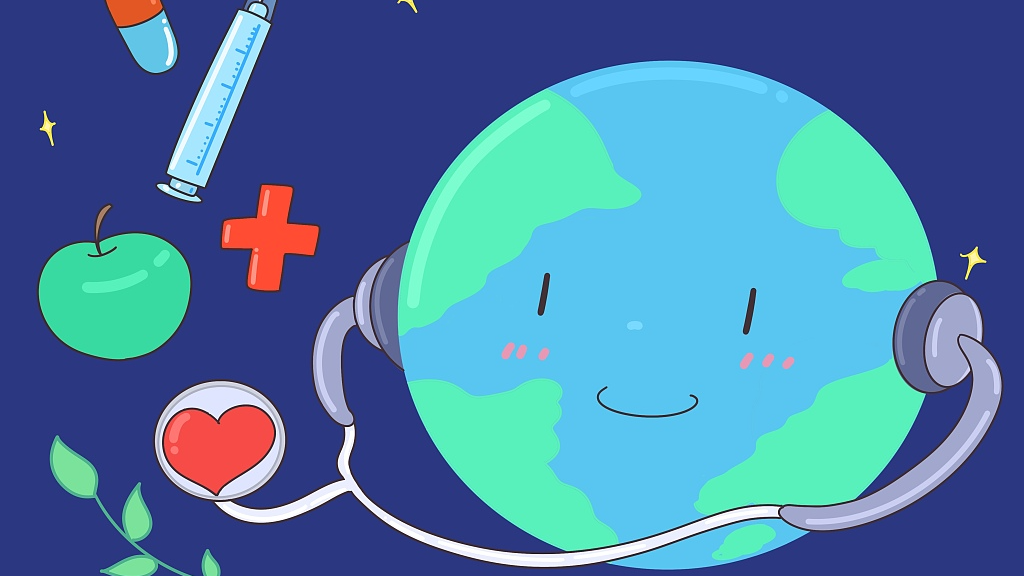
Editor's note: Stephen Ndegwa is a Nairobi-based communication expert, lecturer-scholar at the United States International University-Africa, author and international affairs columnist. The article reflects the author's opinions and not necessarily the views of CGTN.
There is no gainsaying that the COVID-19 pandemic has had a devastating effect on many economies around the world. On April 5, the International Monetary Fund (IMF) appealed for $15 billion in grants for 2022 to mitigate the long-term effects of the pandemic.
While many countries have either opened up fully and others are in the process of doing so, the IMF and partners have warned that the world is not out of the woods yet. Instead, what we need is to establish resilience through a more "comprehensive" and "integrated" pandemic response.
According to a just published report titled "A Global Strategy to Manage the Long-term Risks of COVID-19," the IMF, the Coalition for Epidemic Preparedness Innovations, the Global Fund and the Wellcome Trust reiterated that "overall, health security is economic security … The international community should recognize that its pandemic financing addresses a systemic risk to the global economy."
Basically, the coronavirus still poses a grave risk to the world's social and economic order. For instance, the resurgence of the virus in China, particularly in the financial and commercial hubs of Hong Kong and Shanghai, shows that nothing is to be taken for granted. Furthermore, no one can ascertain the level of potency of variants lurking out there and what kind of responses would be necessary if and when they spread. Either way, billions of dollars will have to be spent.

A health worker teaches children how to wash their hands properly in a kindergarten in Taizhou, east China's Zhejiang Province, April 7, 2022. /CFP
A health worker teaches children how to wash their hands properly in a kindergarten in Taizhou, east China's Zhejiang Province, April 7, 2022. /CFP
Through the theme of "Our planet, our health," World Health Day 2022 on April 7 recognizes the fact that health is an integral part of the resilience of the human race on Earth, which sounds rather obvious until you analyze the amount of resources spent on health budgets overall and expenditure in every country in medication and hospitalization costs.
Experts observe that governments are indeed prioritizing the health sector and economic development, with projections showing that health spending per capita is likely to double in the near future, particularly in low-income countries from 10 percent pre-COVID-19 to 20 percent in 2026.
Still, a healthy planet goes beyond medicines and hospitals. This year's World Health Day theme, as espoused by the World Health Organization (WHO), implies that it includes a world with universal access to clean air, water and food. Good health is also about countries investing sufficiently in people's well-being and making cities healthy habitats.
With pollution being a major contributing factor to the high incidence of diseases like cancer, asthma and heart disease, a clean environment is crucial in ensuring healthy societies. The WHO estimates that environmental causes lead to more than 13 million deaths globally. Moreover, climate change poses one of the biggest existential threats to humans, making establishing mitigation and adaptation measures a major health issue. Climate change has been blamed for, among other maladies, increased respiratory and cardiovascular disease, injuries and premature deaths related to extreme weather events, water-borne illnesses and other infectious diseases.
Now, as the IMF notes, health is a global issue, and no one country can claim victory while others are still vulnerable, especially in a pandemic situation. According to the Bretton Woods institution's January World Economic Outlook Update, the cumulative losses from the pandemic from 2020 to 2024 are estimated to reach $13.8 trillion.
Apart from the direct costs of unhealthiness, there are even more costs due to lost economic potential caused by disease. For instance, a case study by the U.S. Centers for Disease Control and Prevention indicates that more than 877,500 Americans die of heart disease every year. That figure accounts for one-third of all deaths in the country and costs the health care system $216 billion annually and $147 billion in lost productivity on the job.
In matters of health, we are in for the long haul. Even after we manage to subdue the coronavirus, there is no certainty that there will never be another pandemic that may be even worse than the current one. Before COVID-19, the world was still grappling with the effects of HIV and AIDS, tuberculosis and malaria pandemics, which have also cost countries billions of dollars to prevent, treat and manage.
The future survival of humanity depends on how we treat planet Earth. Continued degradation of the environment will boomerang with dire consequences that will escalate and increase disease and death. Our well-being is tightly intertwined with that of the Earth, with each living the quality of life determined by the other.
(If you want to contribute and have specific expertise, please contact us at opinions@cgtn.com. Follow @thouse_opinions on Twitter to discover the latest commentaries on CGTN Opinion Section.)

